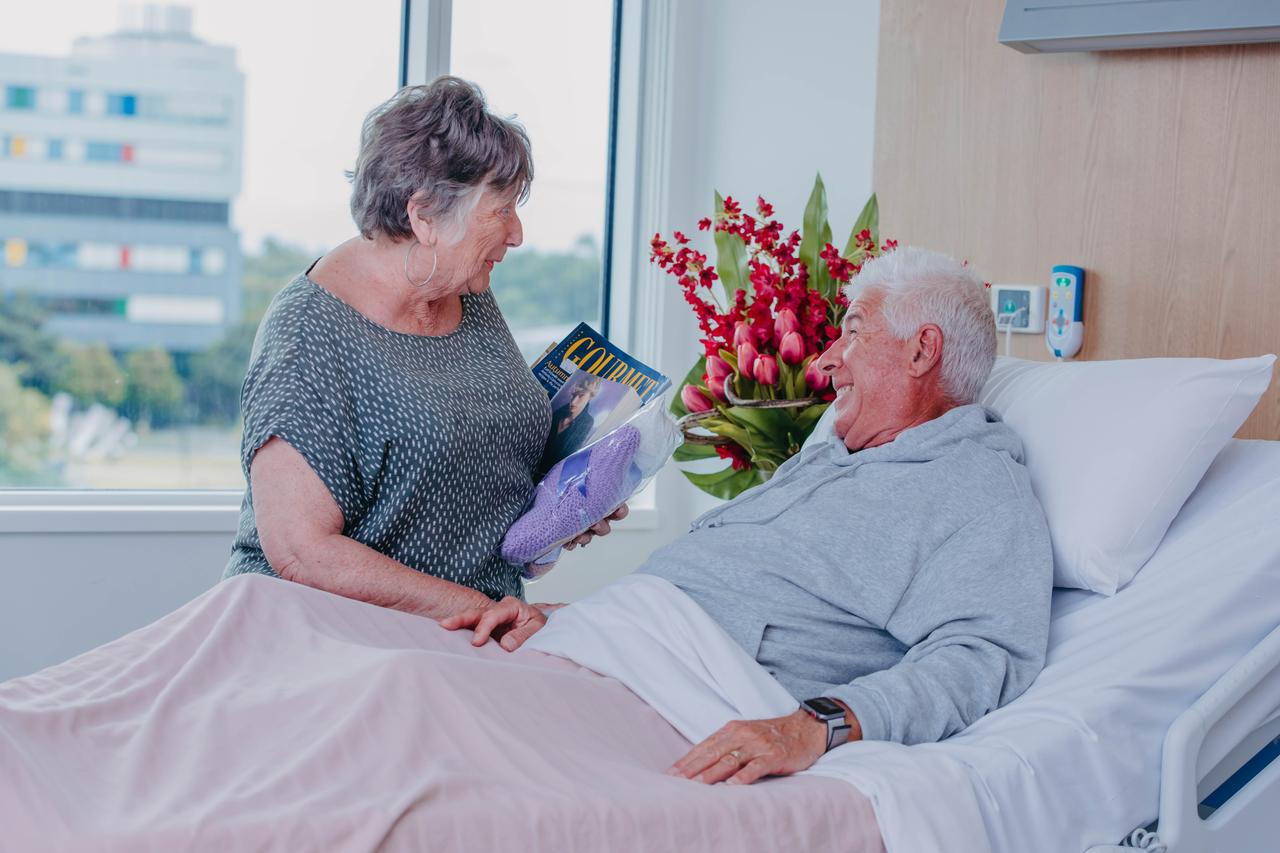
Advanced Respiratory Services
Featuring Endobronchial Ultrasound (EBUS) and Bronchoscopy
When you come to us for respiratory care, you’re in highly-skilled hands. Our multidisciplinary team, including respiratory physicians, cardiothoracic and thoracic surgeons, oncologists, and allied health professionals, work together in a state-of-the-art facility, to provide you with the highest level of care.
Whether you're managing a chronic lung condition, undergoing cancer treatment, or preparing for surgery, we’re here to support your breathing, your recovery, and your overall wellbeing - every step of the way.
We’re located in Melbourne's east and welcome patients from all over Victoria.
We are proud to offer a state-of-the-art EBUS service to enhance our respiratory services at Knox Private Hospital. This service aligns with the recent establishment by the government of the National Lung Cancer Screening Program (NLCSP); however, EBUS can be used for the diagnosis of a variety of other lung conditions as described below.
What is Endobronchial Ultrasound (EBUS)?
Endobronchial Ultrasound (EBUS) is a minimally invasive procedure that provides a real-time, detailed view of the lungs and surrounding lymph nodes. It combines a flexible bronchoscope (a thin tube with a camera) and ultrasound technology to help improve the diagnostic accuracy of taking a tissue sample from your lung:
- Diagnose and stage lung cancer without major surgery
- Investigate other lung diseases, such as infections or inflammatory conditions e.g. sarcoidosis
- Safely obtain biopsies from the lungs or lymph nodes for faster, more precise diagnosis
EBUS is performed under sedation, is generally painless, and offers a quicker recovery time compared to traditional surgical methods.
What is a Bronchoscopy?
A bronchoscopy is a day procedure that allows your doctor to closely examine your airways and lungs using a bronchoscope. This thin, flexible instrument helps assess key parts of your respiratory system, including:
- Larynx (voice box)
- Trachea (windpipe)
- Bronchi and bronchioles (large and medium size airways)
Bronchoscopies are used to:
- Investigate symptoms such as unexplained chronic cough, abnormal scan results, or coughing up blood.
- Diagnose conditions like tumours, lung infections, and inflammatory lung conditions.
- Treat airway problems, remove foreign objects, or clear fluid and mucus from the lungs.

Find a respiratory physician
Our respiratory physicians are dedicated to diagnosing, managing, and treating patients with lung and respiratory conditions and disorders.
Find a cardiothoracic or thoracic surgeon
Our cardiothoracic and thoracic surgeons are highly skilled in diagnosing and treating a wide range of conditions affecting the heart, lungs, and chest.
Find an oncologist
Our oncologists care for patients living with conditions related to cancer and tumours, providing expert care and support throughout their treatment journey.
Our Multidisciplinary Team
Respiratory physicians, cardiothoracic surgeons, and oncologists work together as a team to diagnose, plan, and treat lung conditions, using procedures like EBUS and bronchoscopy to gather information, decide on the best treatment, and perform surgery when needed.
Respiratory physicians
EBUS lets them see and take samples from areas deep in the chest without surgery, often used to check for cancer or infections. Bronchoscopy allows them to look directly into your airways to find out what’s causing symptoms like coughing or wheezing. Both procedures are usually quick and done with sedation, and your lung specialist will guide you through the process to keep you safe and comfortable.
Cardiothoracic and thoracic surgeons
Cardiothoracic and thoracic surgeons work closely with your lung specialist and oncologist, using the results from procedures like EBUS and bronchoscopy to help determine whether surgery is necessary. In addition to surgical interventions, these specialists may also perform advanced procedures to further diagnose or treat complex lung conditions.
Oncologists
EBUS and bronchoscopy to help diagnose and plan treatment for lung cancer. These tests give them important information about the size and spread of the cancer, so they can decide the best treatment, like chemotherapy or targeted medicine.

Why choose Knox Private Hospital?
When you are a private patient at our hospital you’ll enjoy rapid access to diagnostic procedures, surgery and be able to choose your own doctors. You’ll have access to support teams and allied health who provide care in the hospital.
The availability of EBUS and bronchoscopy at Knox Private Hospital offers major advantages for patients in Melbourne’s eastern suburbs:
- Advanced diagnostics, locally
- Specialist care, close to home
- Faster diagnosis, sooner treatment
- Support for Lung Cancer Screening
Onsite services
Knox Private Hospital is home to many onsite support services including:
- Radiology - Lumus radiology
- Pathology - Australian Clinical Labs
- HPS Pharmacy
- 24/7 Emergency Department
- Allied health support for patients, including speech therapists and physiotherapists

State-of-the-art operating theatres
We’re fully equipped to provide an extensive range of procedures. When you choose to be a patient with us, you have minimal wait times for diagnostic procedures and surgery – in weeks, not months.
Your procedure, whether it be diagnostic or surgical, will be performed in one of our 15 state-of-the-art operating theatres.
The private experience
When you choose private, expect better.
At Knox Private Hospital, your private patient experience includes:
- Specialist of your choice
- Admission at a time that is convenient
- Accommodation mainly in single rooms with ensuite
- Private dining menu
- Discharge planning support
- PressReader – digital access to 7,000+ magazines, newspapers and other publications.
Health insurance and out-of- pocket fees
Surgeries and treatments performed in a private hospital involve an out-of-pocket fee. The amount will depend on the surgery or treatment you have and - where you have private health fund cover - whether the treatment or surgery, is included in your cover.
If you don’t have private health insurance or you’re an overseas patient, you can choose to self-fund.


